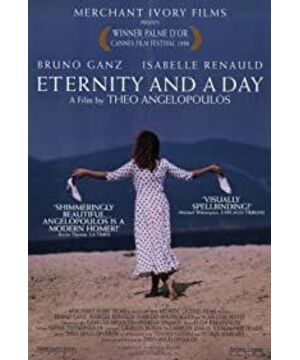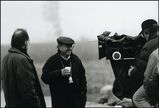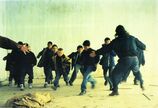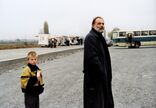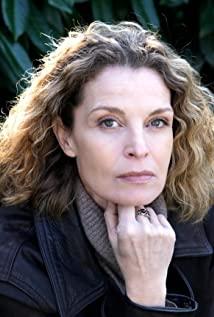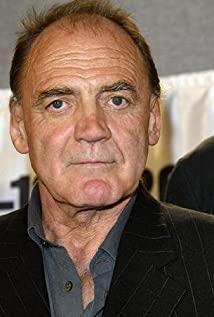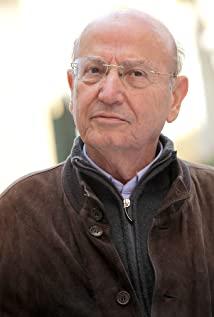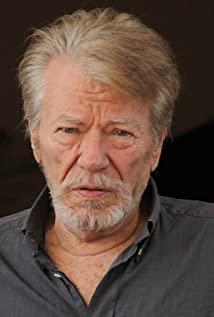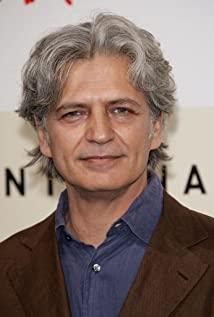/ Organized by Fan Daming /
Time: April 28, 2012 (Saturday) 11:25-11:50 AM
Venue: Henglu Art, No. 202, Nanshan Road, Hangzhou The lecture hall of the museum
(the scene after the viewing of Angelopoulos' work "Eternal and One Day" at Henglu Art Film Bar)
Participants: (Preface) Fan Daming, Jin Aiwu, Ma Yile, Wang Xiling, He Ji, Xia Hantao, Shen Hongnan, Liu Haiqing, Xia Shuaibo (viewers: Chen Jianping, Qiu Huafen, etc.)
Moderator: Fan Daming
Record: Liu Haiqing's
"Eternity and One Day" is the most wonderful Fan Daming in An Zhe's films
: My personal opinion, today's "Eternal" And One Day" is the most exciting of An Zhe's films, and won the Palme d'Or at the Cannes Film Festival in 1998 and other awards. In order to constitute the "May 1st" small long holiday, today was adjusted to work day, many moviegoers lamented that they could not come to watch, and we were helpless if we did not make corresponding adjustments. As of today, all four Angelopoulos films have been released. This film is a little more than two hours long, and there is still a little time below, let's talk about our views on the film together. Madam Wang, let's talk first.
This sentiment of the protagonist must have a considerable historical background and depth
: Alexander, the protagonist of the film, the old poet, was exiled by the authorities very early. After returning to China, although his family was happy, his heart was still wandering. He was looking for vocabulary for writing poetry everywhere, and even went to the folk to buy vocabulary. His wife called him so, and the poet's thoughts were still on his own work. I think the protagonist's feelings must have a considerable historical background and depth, such as the issue of national borders and refugees (Fan inserted: This point is connected with the last "Stork's Hesitation"). Too bad I don't know much about Greek history - if only my father was around, he is as knowledgeable as an encyclopedia.
Life is about to end and yearn for love more, with an optimistic and positive tone, with the warmth of humanity
Jin Aiwu: The protagonist's life is about to end. He yearns for love. For example, he established a relationship with the child who was smuggled from Albania. They cherished each other very much. The poet said to the child: "Your car will arrive in two hours, I only have tonight. Stay with me." Then we saw that the two of them were laughing all the time while sitting on the bus, the smiles were so cheerful and sincere. The film still has an optimistic, positive tone.
Ma Yile: There is a scene like the Berlin Wall on the border, which is a deterrent to those who want to cross. But the old poet helped the little boy go to the autopsy room to secretly retrieve his companion's clothes, set fire to it, and mourned it, which still gave people a warm feeling of humanity.
A person's life is like a journey, such as a bus returning to its original point for a period of time, that is, a circle
king: a person's life is like a journey. For example, for a section of the bus, they get on the bus and go back to the starting point. Life is a circle. There is also a group of people in yellow clothes, I don't know what symbolism, because he has several films. Is it a dead soul?
Ma Yile: Maybe it represents a passer-by.
Fan Daming: In reality, these people are municipal construction workers - either erecting wires, or hoisting cultural relics from the seabed, and so on. This is actually a stylized and personalized logo that An Zhe painted for his films, of course, it is only a superficial logo.
There are pursuits in life, but there are also many discards. The old poet is "When a man is about to die, his words are also good."
Ma Yile: There is a pursuit in life. For the pursuit of his artistic creation, Alexander abandoned a lot, and he did not take good care of his wife, mother, and daughter. So the daughter doesn't actually have much affection for him: they sell their seaside house without telling him; she doesn't want to take care of his dog because her husband is afraid of raising animals. For us, the point of this film is to cherish the present; the past cannot come back. The child in the film asks the old poet: Why don't you eat? He knew he didn't need it anymore, he was taking medicine that day. He spent all the money on the child, first for a large ransom, then for food and "vocabularies". As the so-called "human nature is inherently good", it also responds to an old Chinese saying: "When a person is about to die, his words are also good."
Jin Aiwu: "There is no such thing as a feast in the world." This is how life is. It's sad, but it's good to know how to cherish it.
Why can't the sequel of the old poet Alexander go on?
Xia Hantao: I don't quite understand it. That poet or writer, who planned to continue writing the unfinished works of the predecessor poets, first wrote poems about the revolution, but why couldn't he continue writing later?
Fan Daming: In the film, it is said that because of "poor vocabulary", there is a "buying vocabulary" thing. The kid later joked with Alexander about giving a high price. According to the storyline of the film, the protagonist Alexander spent most of his life studying Solomus, the famous Greek poet, who was a man in the 19th century - he appeared in the film by "traversing" time and space; and Alexander began to continue in his later years. Wrote the unfinished verse of Solomus - Chapter 3 of "Freeing the Trapped", but also seems to be unfinished. Two poets separated by more than 100 years have identities or experiences as exiles. Soxhlet was unfamiliar with his native Greek language because of his exile in Italy, so he had to buy vocabulary from the folk; Alexander had a similar situation.
"Life is sweet" is the basic theme, which reflects An Zhe's ultimate reflection on the meaning and philosophy of
life. For the old poet who is dying of terminal illness, his understanding of this sentence should be especially true. This should be a basic theme of the film. This film can be said to be director An Zhe's ultimate reflection on life, the meaning of life and philosophy. In addition, the film also wrote about the generation gap that may exist between generations. For example, the generation gap between Alexander and his mother and daughter in real life. Before his death, he was very nostalgic for life, and he also asked questions. People with deep knowledge like him are also asking, "How long will it be tomorrow?" The film borrows his wife, Anna, to say: "Tomorrow is one more day than forever!" In fact, it means "today is forever". Perhaps the director is also writing about himself with the help of the protagonist, and seems to have a hunch that he will have such an "eternity and a day" sooner or later. He unfortunately passed away in a car accident in January this year, just more than three months ago. Of course, this was an accident, and it should have been unexpected. We present four of his films this month as a tribute to him.
The emotional interaction between marine civilization and interpersonal
Liu Haiqing: Is there a Greek marine civilization in the film? Because the director likes the sea very much. In "Landscape in the Fog", there is also a scene where the troupe rehearses their lines by the sea.
Shen Hongnan: I think the film is the director expressing his personal feelings. The historical background is all foreshadowing, and the film is about the emotions and interactions between people.
Fan Daming: For example, the little boy was chased by the police while cleaning the car, and was pulled into the car by the old poet for protection. But returned with a smile. I think that smile is really beautiful and contagious, and it may be this smile that makes the old poet pay attention to him and becomes the reason for his inner emotions that want to help him.
The underground black trade of abducting and selling children is already well organized.
Liu Haiqing: But is it a good result that the little boy was sent back in the end?
Fan Daming: He has no relatives in Albania, but in Greece he can only make a living by cleaning cars on the street. This has to avoid the pursuit of the police-the police belong to the white society; he must be careful not to be caught and trafficked at any time-the latter is true. They have underground special teams to provide street children for local wealthy people who want to foster children, and make profits from it. At the end of this scene, the film also used a scene to show the child trafficker's car running away, and the white plastic seats that were temporarily arranged for use in the underground trading place were stacked on the car. Take the chair! This is a very interesting little detail, and the director did not let it go easily. It shows that this kind of underground black trade of kidnapping and selling children is already very well organized.
Written talk outside the meeting: The refinement of the structure or conception of the film's play, and the origin of the "traveling" technique
Fan Daming: The brilliance of this film, apart from what everyone has said above, from the point of view of film art, also lies in the fineness of the whole play structure or conception of the film: the protagonist's views on issues such as life, death and eternity. Thinking and questioning this kind of subjective psychological awareness (mostly expressed through inner monologues and other techniques), his relationship with generations of his family, as well as the issues of living beings in today's Greek society, including borders and refugees, and even modern Greece History and culture (through the protagonist continuing to write the unfinished works of the predecessors, etc.), these all-encompassing social and historical contents are concentrated on the day before the protagonist's death - from the housekeeper Orania who accompanied her for three years to being slaughtered. From the Sunday morning of the dismissal, to the night of the day the little boy was sent off - to show it. Play your favorite music (a tacit echo with the faceless owner of the house opposite), lead the dog out, deliver an affectionate letter left by the deceased wife to her daughter's house, and read the letter by her daughter (the voice of the deceased wife with a voiceover) , and then cut into the beautiful past of the seaside villa (the family gathering when the daughter was born a full moon) and today (the sale and demolition); from the daughter and son-in-law refusing to adopt his pet dog to the housekeeper who just bid farewell (she accepted his pet dog), At the same time, it shows the wedding held by the housekeeper's son (the meaning should be: the life and life around the protagonist are still going on) - and the above-mentioned ordinary things in the past are described by describing the new people and new things that the protagonist encountered that day (rescuing a Street children who were chased by the police and abducted by the underworld) were linked together as a series of clues and basic plot lines. The film thus adopts the time-space "travel" method, and I am also considering this. This method, which seems to be very popular today, is probably the origin of the pilot experiment in this film. The difference between the "traveling" method of the film and the "flashback" or stream-of-consciousness methods we used to say is that it is a completely bizarre and unrealistic surrealist method. imagined. In this film, this "travel" can be either the "traveling" of modern people to ancient times (today's old poets appeared at the family gathering of their daughter's full moon 30 years ago), or the "travel" of ancient people to the present ( Such as the 19th century poet Solomus boarding the bus that the protagonist and the little boy ride). Its bizarreness lies in recreating a virtual magical reality on the screen through the interlacing of reality and fantasy; and the transformation it creates does not have the creators great creative artistic courage, and the artistic realm does not enter into such a state. If it is not enough to express specific emotions and meaning pursuits, it cannot be produced.
Salute to Anzhe! His movies and his heroic soul will also last forever!
I would like to take this opportunity to express our remembrance and memory of the contemporary film master An Zhe through our April 2012 "Angelopoulos Film Month" and the three post-viewing forum minutes formed by film friends.
Organized on May 10, 2012
View more about Eternity and a Day reviews


